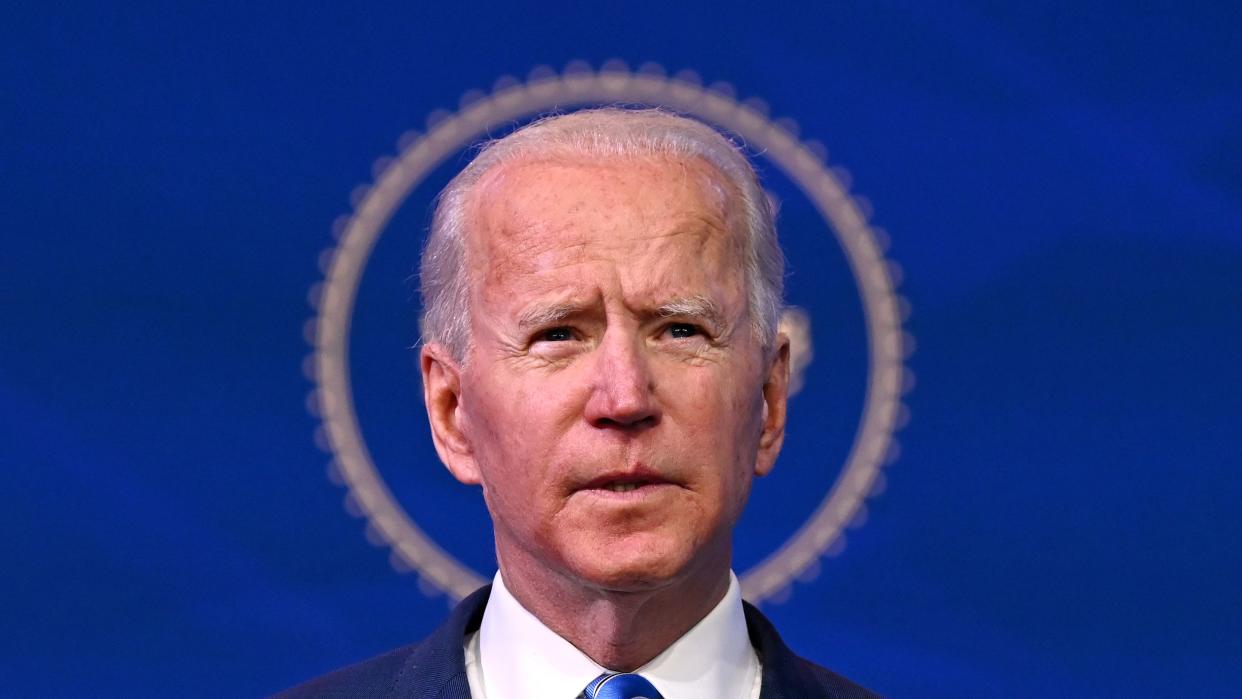Biden unveils $1.9 trillion plan to 'rescue' America from the pandemic
President-elect Joe Biden unveiled an ambitious plan Thursday to stimulate the U.S. economy, which has been crippled by the coronavirus pandemic, and to defeat the virus that has so far killed more than 388,000 Americans.
The incoming administration’s agenda comes in two parts: rescue and recovery. Biden laid out the finer points of the $1.9 trillion rescue plan, and noted that more details on the recovery plan, which will include proposals on rebuilding American infrastructure, will be announced in the coming weeks.
“From the very first of the nearly 400,000 lost American souls and counting to the millions of you just looking for a fighting chance in this economy, I promise you we will not forget you,” Biden said in a speech delivered in Wilmington, Del.
Thursday’s proposals consisted of three major requests: $400 billion for coronavirus management, a trillion dollars of direct coronavirus relief (which includes a supplemental $1,400 relief checks to round out to the promised $2,000), and $440 billion in aid to communities and businesses.
Those high ticket, populist proposals face an uncertain future in a bitterly divided Congress in which Democrats have a slim majority. The nearly $2 trillion cost of the rescue portion of the plan is expected to be matched by the price tag on the recovery side that will be laid out in detail next week. Considering that many Republicans bristled when President Trump proposed $2,000 stimulus checks, the addition of costly new programs is likely to be met with defiance. Some centrist Democrats, too, are likely to push back.
House Speaker Nancy Pelosi has seen her margin shrink to 11 seats, which will limit her ability to push the envelope. Meanwhile, Sen. Majority Leader Mitch McConnell’s forces can still filibuster almost any legislation that fails to attract a supermajority of 60 votes.
The once-a-year parliamentary process known as budget reconciliation would allow Biden to bypass the filibuster and advance major legislation with a simple majority — provided the legislation itself is directly related to spending and/or revenue. But he probably can’t use it twice in a row for both his rescue and recovery packages, and if and when he does use it, any bipartisanship honeymoon he hoped to enjoy will end. What’s more, with just 51 votes in the Senate (counting Vice President-elect Kamala Harris as the tie-breaker) a single Democratic defection is enough to sink even a package designed to pass via reconciliation — which means moderates such as West Virginia Sen. Joe Manchin would have to approve.

Still, Biden seemed hopeful during his Thursday evening address that his plan could be enacted swifty.
"We can do these bold, practical things now,” said Biden, later adding “there will be stumbles. But I will always be honest with you about both the progress we're making and what setbacks we meet."
A portion of the plan zeroes in on the country’s vaccine distribution effort, which Biden said “has been a dismal failure so far." To rectify the sluggish rollout, Biden said he would ask Congress for $20 billion for a national vaccination program in partnerships with states and local governments. This money would go to building community vaccination centers and mobile units in harder to reach areas of the country, all in hopes of delivering the vaccine safely and at no cost to the public.
“Tomorrow, I will lay out our vaccination plan to correct course, and meet our goal of 100 million shots at the end of my first 100 days as president," Biden said.
When President Trump launched Operation Warp Speed, his “Manhattan Project-style” vaccine effort, the goal was to deliver 300 million doses by the end of 2020. Later his administration slashed that estimate to 40 million doses, then 20 million. By the time Dec. 31 finally arrived, just 2.6 million shots had been administered.
Issues with every aspect of the U.S. vaccination campaign — shortages in the supply chain; lack of funding and coordination from the federal government; resource and eligibility bottlenecks at the state level; even resistance from frontline workers — have slowed the process.
As a result, a mere 3.3 percent of Americans have initiated immunization in the month since the first shots were administered here. For a sense of what’s possible elsewhere, Israel has already given shots to 22 percent of its population (not including Palestinians). America is averaging 710,000 shots every 24 hours — a rate that has doubled in just the last week.
Other elements of the Biden relief plan include raising the minimum wage to $15 an hour, an expanded child tax credit, $160 billion to fund a national program of vaccination and containment efforts, and $400 per week in unemployment benefits. He is adamant that his administration will lay the groundwork necessary for a majority of K-18 schools in the country to reopen in the first 100 days of his administration.
"A crisis of deep human suffering is in plain sight. There's no time to waste," said Biden. "We have to act and we have to act now."
_____
Read more from Yahoo News:
